Effectiveness of Mindfulness-Based Therapeutic Interventions on Cognitive Functioning and Psychological Health Outcome of the Elderly
VerifiedAdded on 2022/10/10
|15
|3303
|339
AI Summary
This paper critically appraises the quality of three research papers that assess the efficiency of mindfulness-based therapeutic interventions on the improvement of cognitive functioning and psychological health outcome of the elderly. The research papers considered comprise of a randomized controlled trial, cross-sectional study, and a meta-analysis. The methodology section explains the methodology undertaken to retrieve the three research articles. The results section presents the critical appraisal of the three research papers. The discussion section evaluates the strengths and weaknesses of the research papers and suggests possible research biases.
Contribute Materials
Your contribution can guide someone’s learning journey. Share your
documents today.
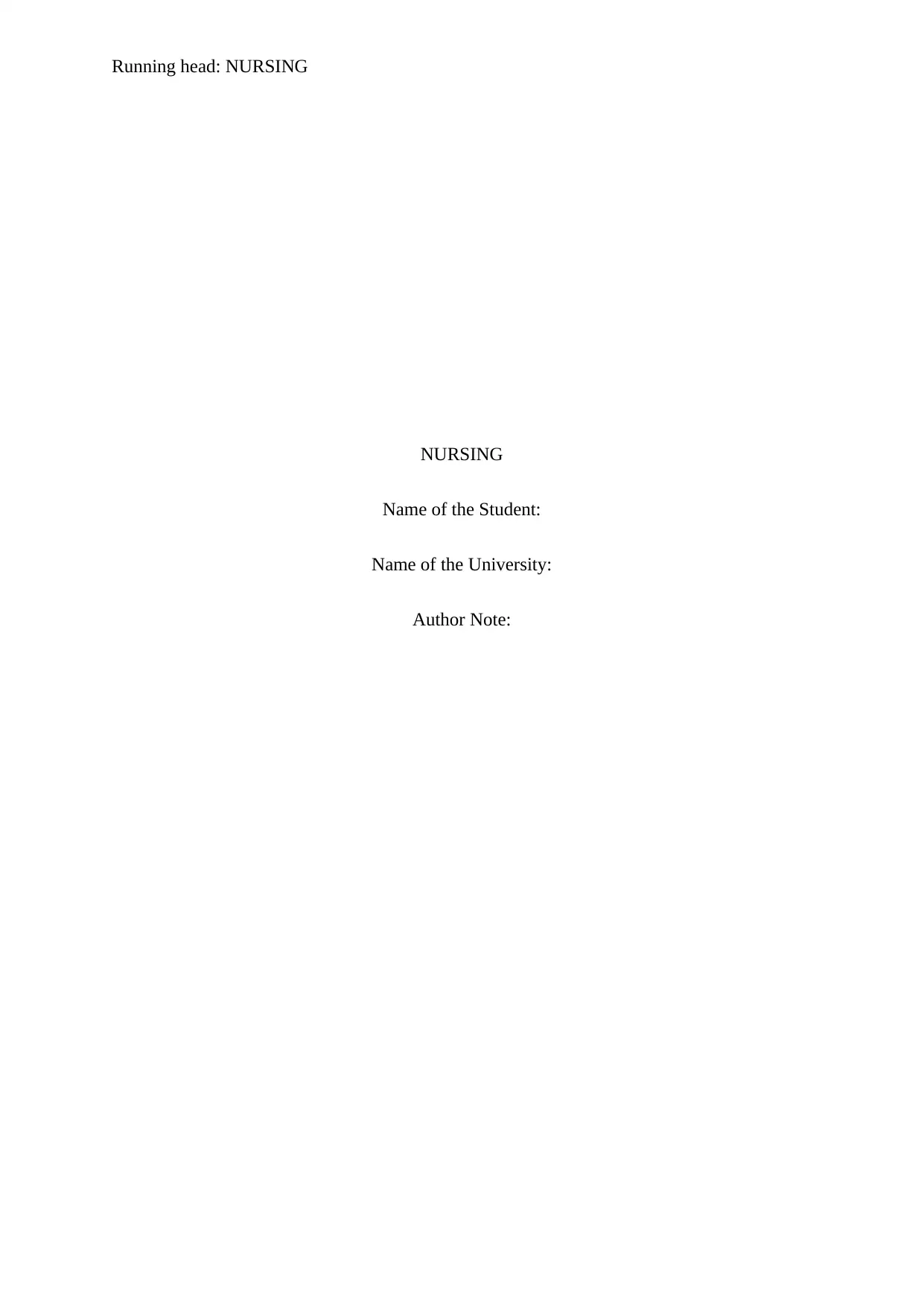
Running head: NURSING
NURSING
Name of the Student:
Name of the University:
Author Note:
NURSING
Name of the Student:
Name of the University:
Author Note:
Secure Best Marks with AI Grader
Need help grading? Try our AI Grader for instant feedback on your assignments.
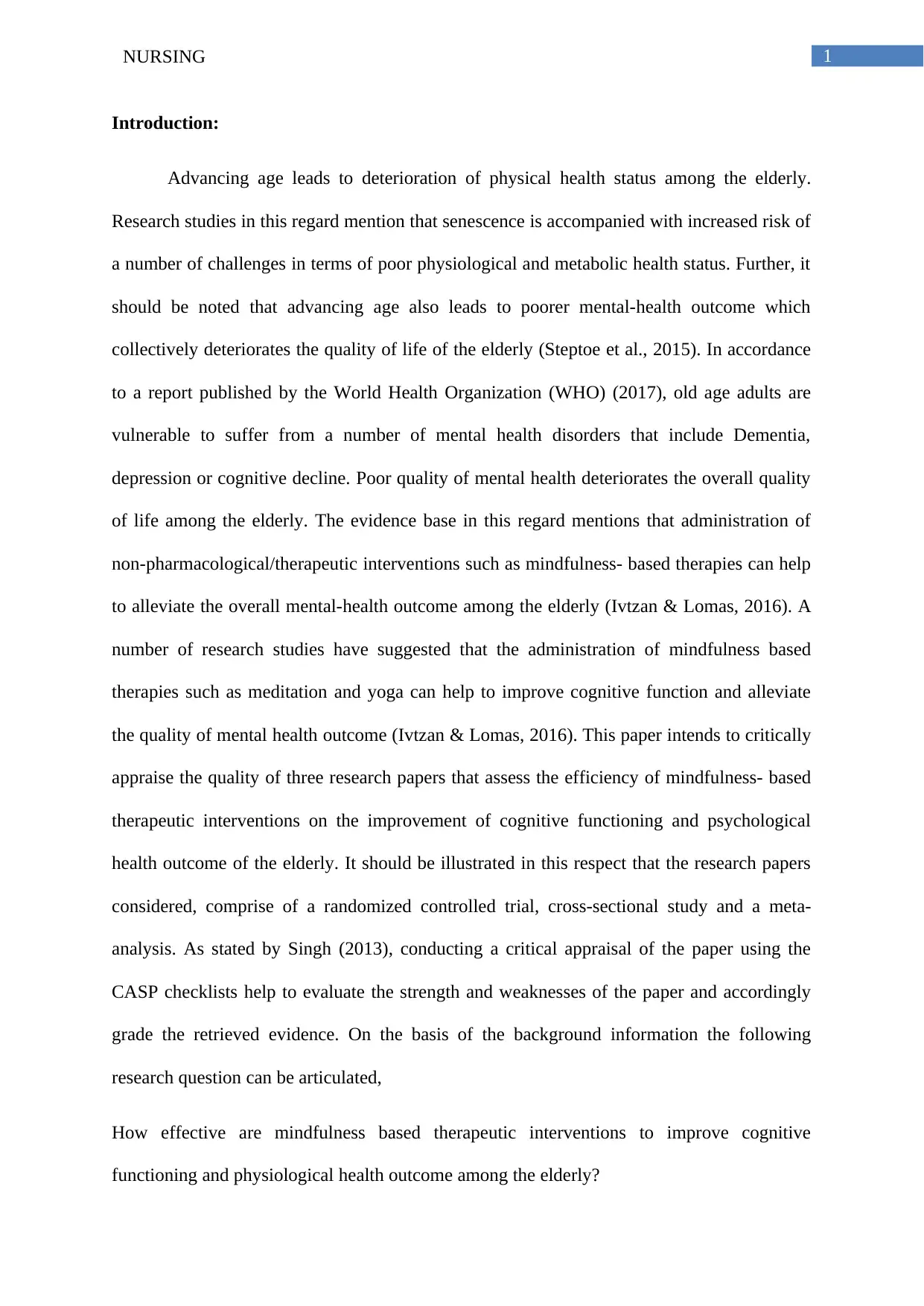
NURSING 1
Introduction:
Advancing age leads to deterioration of physical health status among the elderly.
Research studies in this regard mention that senescence is accompanied with increased risk of
a number of challenges in terms of poor physiological and metabolic health status. Further, it
should be noted that advancing age also leads to poorer mental-health outcome which
collectively deteriorates the quality of life of the elderly (Steptoe et al., 2015). In accordance
to a report published by the World Health Organization (WHO) (2017), old age adults are
vulnerable to suffer from a number of mental health disorders that include Dementia,
depression or cognitive decline. Poor quality of mental health deteriorates the overall quality
of life among the elderly. The evidence base in this regard mentions that administration of
non-pharmacological/therapeutic interventions such as mindfulness- based therapies can help
to alleviate the overall mental-health outcome among the elderly (Ivtzan & Lomas, 2016). A
number of research studies have suggested that the administration of mindfulness based
therapies such as meditation and yoga can help to improve cognitive function and alleviate
the quality of mental health outcome (Ivtzan & Lomas, 2016). This paper intends to critically
appraise the quality of three research papers that assess the efficiency of mindfulness- based
therapeutic interventions on the improvement of cognitive functioning and psychological
health outcome of the elderly. It should be illustrated in this respect that the research papers
considered, comprise of a randomized controlled trial, cross-sectional study and a meta-
analysis. As stated by Singh (2013), conducting a critical appraisal of the paper using the
CASP checklists help to evaluate the strength and weaknesses of the paper and accordingly
grade the retrieved evidence. On the basis of the background information the following
research question can be articulated,
How effective are mindfulness based therapeutic interventions to improve cognitive
functioning and physiological health outcome among the elderly?
Introduction:
Advancing age leads to deterioration of physical health status among the elderly.
Research studies in this regard mention that senescence is accompanied with increased risk of
a number of challenges in terms of poor physiological and metabolic health status. Further, it
should be noted that advancing age also leads to poorer mental-health outcome which
collectively deteriorates the quality of life of the elderly (Steptoe et al., 2015). In accordance
to a report published by the World Health Organization (WHO) (2017), old age adults are
vulnerable to suffer from a number of mental health disorders that include Dementia,
depression or cognitive decline. Poor quality of mental health deteriorates the overall quality
of life among the elderly. The evidence base in this regard mentions that administration of
non-pharmacological/therapeutic interventions such as mindfulness- based therapies can help
to alleviate the overall mental-health outcome among the elderly (Ivtzan & Lomas, 2016). A
number of research studies have suggested that the administration of mindfulness based
therapies such as meditation and yoga can help to improve cognitive function and alleviate
the quality of mental health outcome (Ivtzan & Lomas, 2016). This paper intends to critically
appraise the quality of three research papers that assess the efficiency of mindfulness- based
therapeutic interventions on the improvement of cognitive functioning and psychological
health outcome of the elderly. It should be illustrated in this respect that the research papers
considered, comprise of a randomized controlled trial, cross-sectional study and a meta-
analysis. As stated by Singh (2013), conducting a critical appraisal of the paper using the
CASP checklists help to evaluate the strength and weaknesses of the paper and accordingly
grade the retrieved evidence. On the basis of the background information the following
research question can be articulated,
How effective are mindfulness based therapeutic interventions to improve cognitive
functioning and physiological health outcome among the elderly?
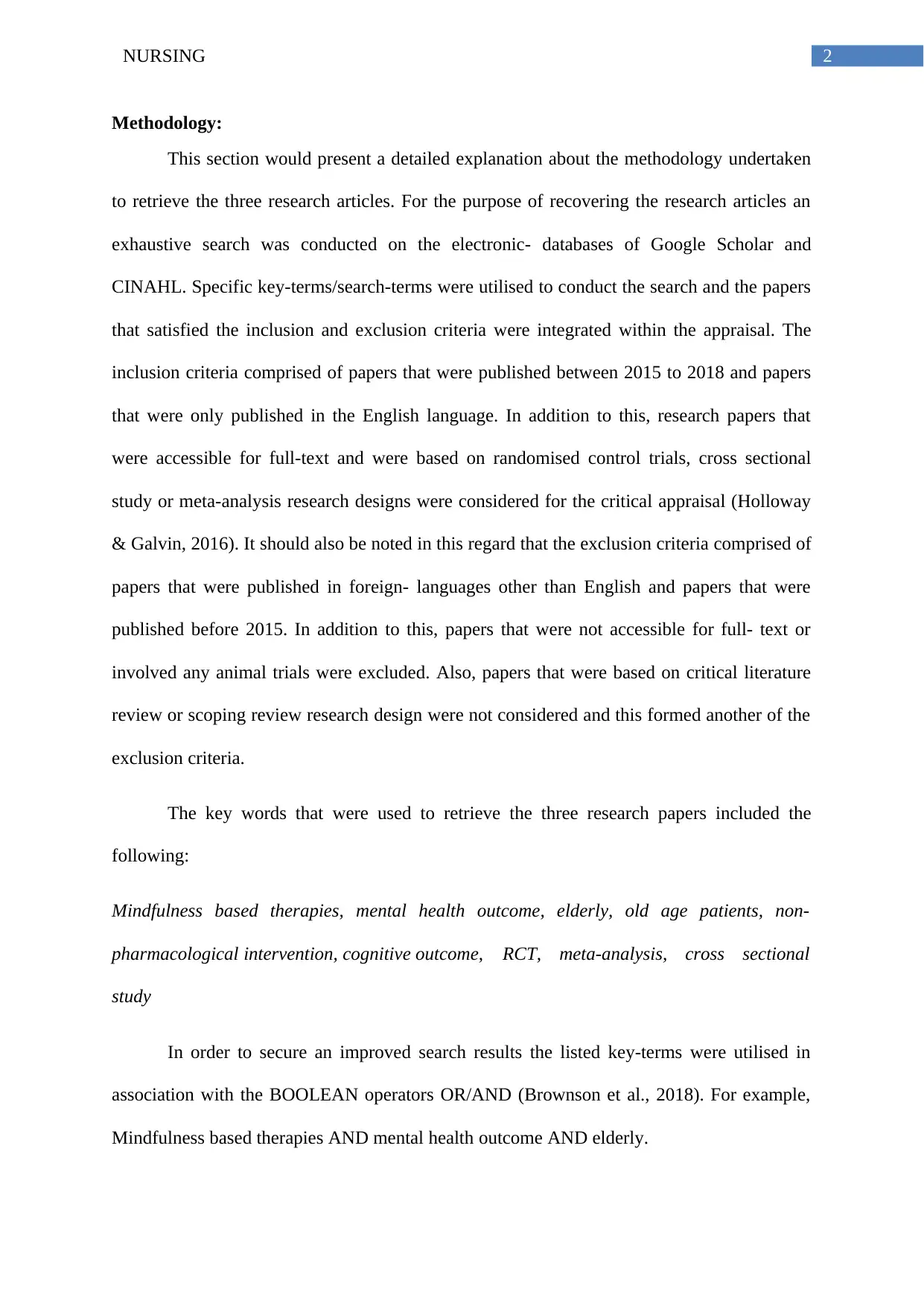
2NURSING
Methodology:
This section would present a detailed explanation about the methodology undertaken
to retrieve the three research articles. For the purpose of recovering the research articles an
exhaustive search was conducted on the electronic- databases of Google Scholar and
CINAHL. Specific key-terms/search-terms were utilised to conduct the search and the papers
that satisfied the inclusion and exclusion criteria were integrated within the appraisal. The
inclusion criteria comprised of papers that were published between 2015 to 2018 and papers
that were only published in the English language. In addition to this, research papers that
were accessible for full-text and were based on randomised control trials, cross sectional
study or meta-analysis research designs were considered for the critical appraisal (Holloway
& Galvin, 2016). It should also be noted in this regard that the exclusion criteria comprised of
papers that were published in foreign- languages other than English and papers that were
published before 2015. In addition to this, papers that were not accessible for full- text or
involved any animal trials were excluded. Also, papers that were based on critical literature
review or scoping review research design were not considered and this formed another of the
exclusion criteria.
The key words that were used to retrieve the three research papers included the
following:
Mindfulness based therapies, mental health outcome, elderly, old age patients, non-
pharmacological intervention, cognitive outcome, RCT, meta-analysis, cross sectional
study
In order to secure an improved search results the listed key-terms were utilised in
association with the BOOLEAN operators OR/AND (Brownson et al., 2018). For example,
Mindfulness based therapies AND mental health outcome AND elderly.
Methodology:
This section would present a detailed explanation about the methodology undertaken
to retrieve the three research articles. For the purpose of recovering the research articles an
exhaustive search was conducted on the electronic- databases of Google Scholar and
CINAHL. Specific key-terms/search-terms were utilised to conduct the search and the papers
that satisfied the inclusion and exclusion criteria were integrated within the appraisal. The
inclusion criteria comprised of papers that were published between 2015 to 2018 and papers
that were only published in the English language. In addition to this, research papers that
were accessible for full-text and were based on randomised control trials, cross sectional
study or meta-analysis research designs were considered for the critical appraisal (Holloway
& Galvin, 2016). It should also be noted in this regard that the exclusion criteria comprised of
papers that were published in foreign- languages other than English and papers that were
published before 2015. In addition to this, papers that were not accessible for full- text or
involved any animal trials were excluded. Also, papers that were based on critical literature
review or scoping review research design were not considered and this formed another of the
exclusion criteria.
The key words that were used to retrieve the three research papers included the
following:
Mindfulness based therapies, mental health outcome, elderly, old age patients, non-
pharmacological intervention, cognitive outcome, RCT, meta-analysis, cross sectional
study
In order to secure an improved search results the listed key-terms were utilised in
association with the BOOLEAN operators OR/AND (Brownson et al., 2018). For example,
Mindfulness based therapies AND mental health outcome AND elderly.
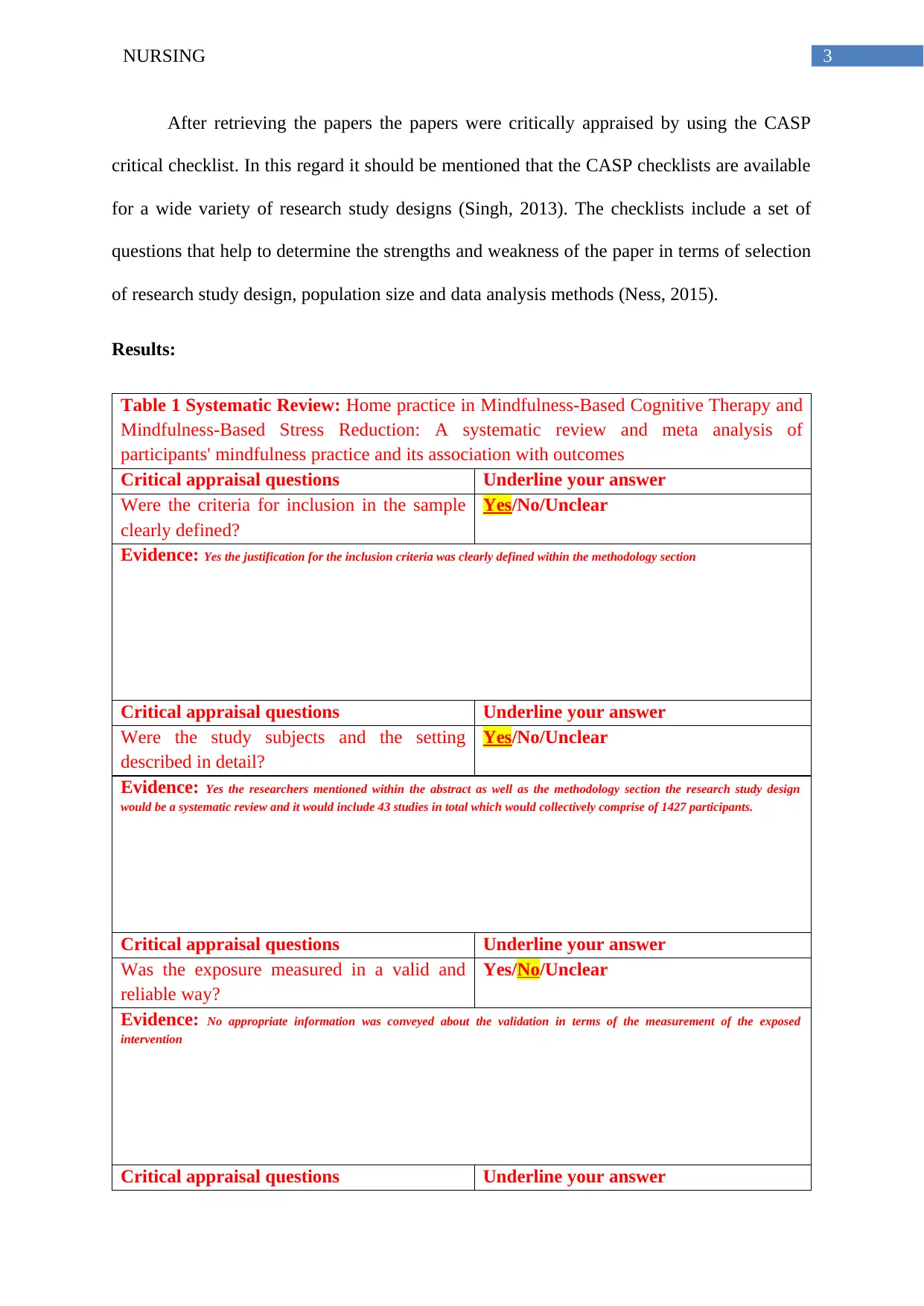
3NURSING
After retrieving the papers the papers were critically appraised by using the CASP
critical checklist. In this regard it should be mentioned that the CASP checklists are available
for a wide variety of research study designs (Singh, 2013). The checklists include a set of
questions that help to determine the strengths and weakness of the paper in terms of selection
of research study design, population size and data analysis methods (Ness, 2015).
Results:
Table 1 Systematic Review: Home practice in Mindfulness-Based Cognitive Therapy and
Mindfulness-Based Stress Reduction: A systematic review and meta analysis of
participants' mindfulness practice and its association with outcomes
Critical appraisal questions Underline your answer
Were the criteria for inclusion in the sample
clearly defined?
Yes/No/Unclear
Evidence: Yes the justification for the inclusion criteria was clearly defined within the methodology section
Critical appraisal questions Underline your answer
Were the study subjects and the setting
described in detail?
Yes/No/Unclear
Evidence: Yes the researchers mentioned within the abstract as well as the methodology section the research study design
would be a systematic review and it would include 43 studies in total which would collectively comprise of 1427 participants.
Critical appraisal questions Underline your answer
Was the exposure measured in a valid and
reliable way?
Yes/No/Unclear
Evidence: No appropriate information was conveyed about the validation in terms of the measurement of the exposed
intervention
Critical appraisal questions Underline your answer
After retrieving the papers the papers were critically appraised by using the CASP
critical checklist. In this regard it should be mentioned that the CASP checklists are available
for a wide variety of research study designs (Singh, 2013). The checklists include a set of
questions that help to determine the strengths and weakness of the paper in terms of selection
of research study design, population size and data analysis methods (Ness, 2015).
Results:
Table 1 Systematic Review: Home practice in Mindfulness-Based Cognitive Therapy and
Mindfulness-Based Stress Reduction: A systematic review and meta analysis of
participants' mindfulness practice and its association with outcomes
Critical appraisal questions Underline your answer
Were the criteria for inclusion in the sample
clearly defined?
Yes/No/Unclear
Evidence: Yes the justification for the inclusion criteria was clearly defined within the methodology section
Critical appraisal questions Underline your answer
Were the study subjects and the setting
described in detail?
Yes/No/Unclear
Evidence: Yes the researchers mentioned within the abstract as well as the methodology section the research study design
would be a systematic review and it would include 43 studies in total which would collectively comprise of 1427 participants.
Critical appraisal questions Underline your answer
Was the exposure measured in a valid and
reliable way?
Yes/No/Unclear
Evidence: No appropriate information was conveyed about the validation in terms of the measurement of the exposed
intervention
Critical appraisal questions Underline your answer
Secure Best Marks with AI Grader
Need help grading? Try our AI Grader for instant feedback on your assignments.
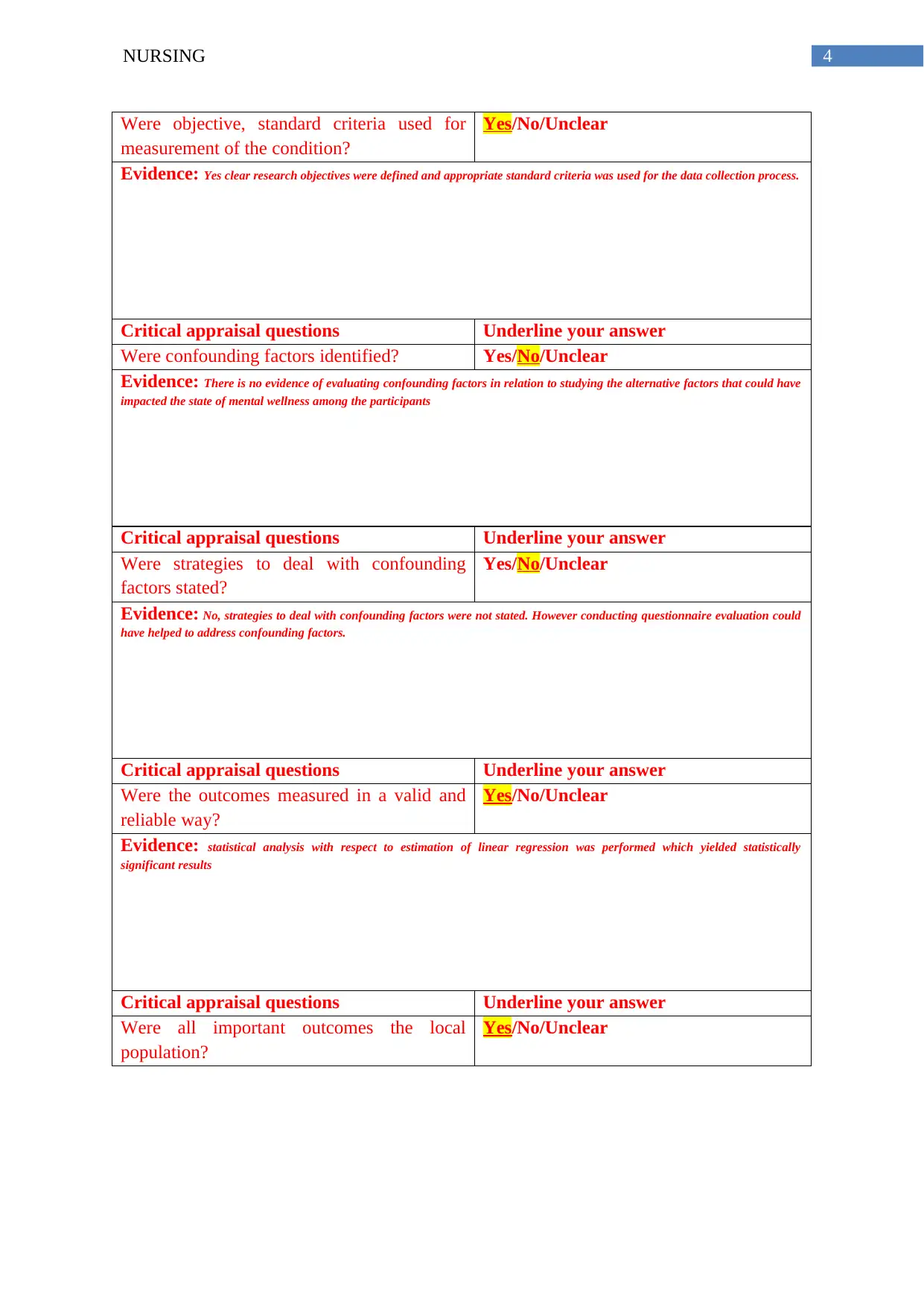
4NURSING
Were objective, standard criteria used for
measurement of the condition?
Yes/No/Unclear
Evidence: Yes clear research objectives were defined and appropriate standard criteria was used for the data collection process.
Critical appraisal questions Underline your answer
Were confounding factors identified? Yes/No/Unclear
Evidence: There is no evidence of evaluating confounding factors in relation to studying the alternative factors that could have
impacted the state of mental wellness among the participants
Critical appraisal questions Underline your answer
Were strategies to deal with confounding
factors stated?
Yes/No/Unclear
Evidence: No, strategies to deal with confounding factors were not stated. However conducting questionnaire evaluation could
have helped to address confounding factors.
Critical appraisal questions Underline your answer
Were the outcomes measured in a valid and
reliable way?
Yes/No/Unclear
Evidence: statistical analysis with respect to estimation of linear regression was performed which yielded statistically
significant results
Critical appraisal questions Underline your answer
Were all important outcomes the local
population?
Yes/No/Unclear
Were objective, standard criteria used for
measurement of the condition?
Yes/No/Unclear
Evidence: Yes clear research objectives were defined and appropriate standard criteria was used for the data collection process.
Critical appraisal questions Underline your answer
Were confounding factors identified? Yes/No/Unclear
Evidence: There is no evidence of evaluating confounding factors in relation to studying the alternative factors that could have
impacted the state of mental wellness among the participants
Critical appraisal questions Underline your answer
Were strategies to deal with confounding
factors stated?
Yes/No/Unclear
Evidence: No, strategies to deal with confounding factors were not stated. However conducting questionnaire evaluation could
have helped to address confounding factors.
Critical appraisal questions Underline your answer
Were the outcomes measured in a valid and
reliable way?
Yes/No/Unclear
Evidence: statistical analysis with respect to estimation of linear regression was performed which yielded statistically
significant results
Critical appraisal questions Underline your answer
Were all important outcomes the local
population?
Yes/No/Unclear
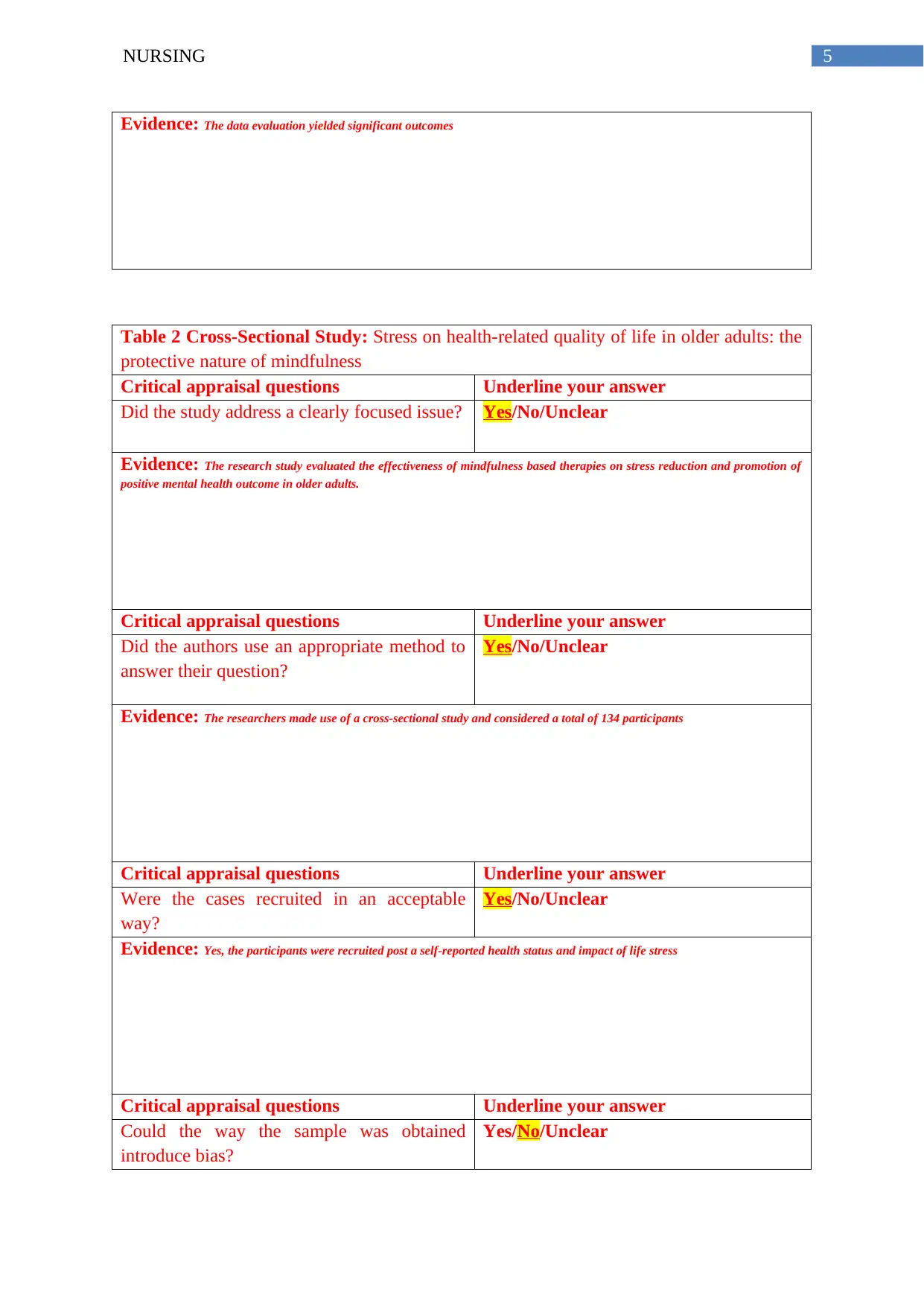
5NURSING
Evidence: The data evaluation yielded significant outcomes
Table 2 Cross-Sectional Study: Stress on health-related quality of life in older adults: the
protective nature of mindfulness
Critical appraisal questions Underline your answer
Did the study address a clearly focused issue? Yes/No/Unclear
Evidence: The research study evaluated the effectiveness of mindfulness based therapies on stress reduction and promotion of
positive mental health outcome in older adults.
Critical appraisal questions Underline your answer
Did the authors use an appropriate method to
answer their question?
Yes/No/Unclear
Evidence: The researchers made use of a cross-sectional study and considered a total of 134 participants
Critical appraisal questions Underline your answer
Were the cases recruited in an acceptable
way?
Yes/No/Unclear
Evidence: Yes, the participants were recruited post a self-reported health status and impact of life stress
Critical appraisal questions Underline your answer
Could the way the sample was obtained
introduce bias?
Yes/No/Unclear
Evidence: The data evaluation yielded significant outcomes
Table 2 Cross-Sectional Study: Stress on health-related quality of life in older adults: the
protective nature of mindfulness
Critical appraisal questions Underline your answer
Did the study address a clearly focused issue? Yes/No/Unclear
Evidence: The research study evaluated the effectiveness of mindfulness based therapies on stress reduction and promotion of
positive mental health outcome in older adults.
Critical appraisal questions Underline your answer
Did the authors use an appropriate method to
answer their question?
Yes/No/Unclear
Evidence: The researchers made use of a cross-sectional study and considered a total of 134 participants
Critical appraisal questions Underline your answer
Were the cases recruited in an acceptable
way?
Yes/No/Unclear
Evidence: Yes, the participants were recruited post a self-reported health status and impact of life stress
Critical appraisal questions Underline your answer
Could the way the sample was obtained
introduce bias?
Yes/No/Unclear
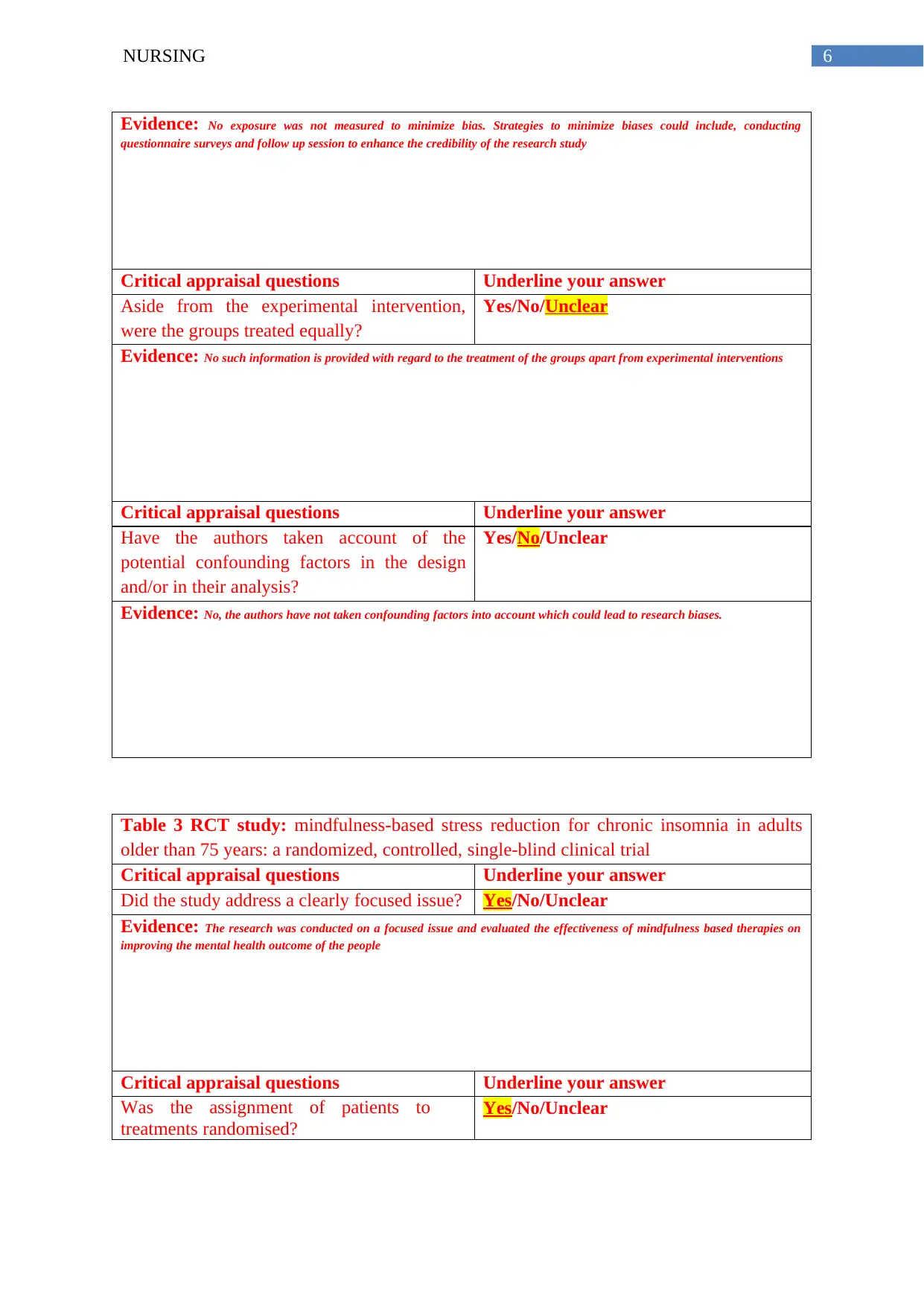
6NURSING
Evidence: No exposure was not measured to minimize bias. Strategies to minimize biases could include, conducting
questionnaire surveys and follow up session to enhance the credibility of the research study
Critical appraisal questions Underline your answer
Aside from the experimental intervention,
were the groups treated equally?
Yes/No/Unclear
Evidence: No such information is provided with regard to the treatment of the groups apart from experimental interventions
Critical appraisal questions Underline your answer
Have the authors taken account of the
potential confounding factors in the design
and/or in their analysis?
Yes/No/Unclear
Evidence: No, the authors have not taken confounding factors into account which could lead to research biases.
Table 3 RCT study: mindfulness-based stress reduction for chronic insomnia in adults
older than 75 years: a randomized, controlled, single-blind clinical trial
Critical appraisal questions Underline your answer
Did the study address a clearly focused issue? Yes/No/Unclear
Evidence: The research was conducted on a focused issue and evaluated the effectiveness of mindfulness based therapies on
improving the mental health outcome of the people
Critical appraisal questions Underline your answer
Was the assignment of patients to
treatments randomised?
Yes/No/Unclear
Evidence: No exposure was not measured to minimize bias. Strategies to minimize biases could include, conducting
questionnaire surveys and follow up session to enhance the credibility of the research study
Critical appraisal questions Underline your answer
Aside from the experimental intervention,
were the groups treated equally?
Yes/No/Unclear
Evidence: No such information is provided with regard to the treatment of the groups apart from experimental interventions
Critical appraisal questions Underline your answer
Have the authors taken account of the
potential confounding factors in the design
and/or in their analysis?
Yes/No/Unclear
Evidence: No, the authors have not taken confounding factors into account which could lead to research biases.
Table 3 RCT study: mindfulness-based stress reduction for chronic insomnia in adults
older than 75 years: a randomized, controlled, single-blind clinical trial
Critical appraisal questions Underline your answer
Did the study address a clearly focused issue? Yes/No/Unclear
Evidence: The research was conducted on a focused issue and evaluated the effectiveness of mindfulness based therapies on
improving the mental health outcome of the people
Critical appraisal questions Underline your answer
Was the assignment of patients to
treatments randomised?
Yes/No/Unclear
Paraphrase This Document
Need a fresh take? Get an instant paraphrase of this document with our AI Paraphraser
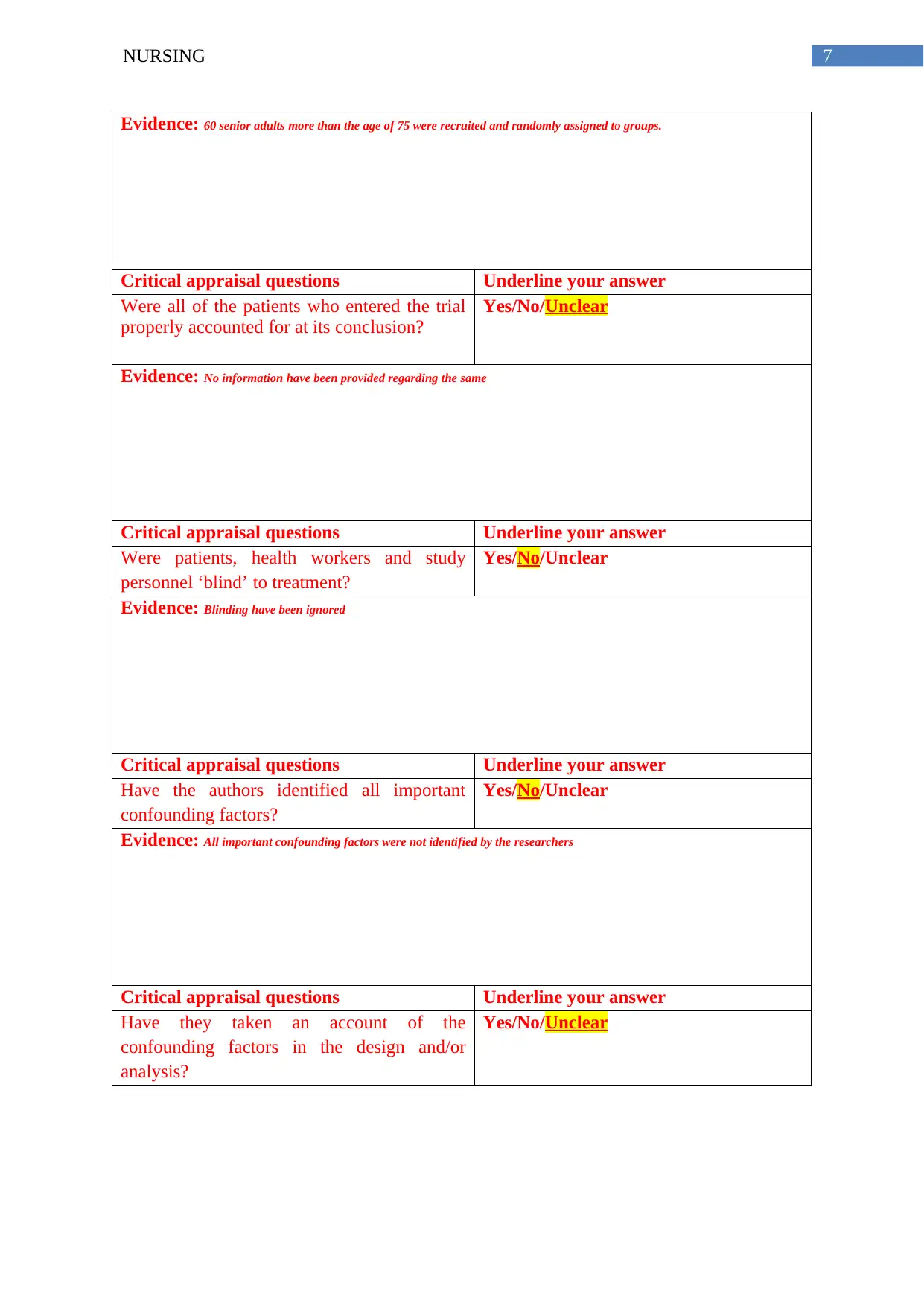
7NURSING
Evidence: 60 senior adults more than the age of 75 were recruited and randomly assigned to groups.
Critical appraisal questions Underline your answer
Were all of the patients who entered the trial
properly accounted for at its conclusion?
Yes/No/Unclear
Evidence: No information have been provided regarding the same
Critical appraisal questions Underline your answer
Were patients, health workers and study
personnel ‘blind’ to treatment?
Yes/No/Unclear
Evidence: Blinding have been ignored
Critical appraisal questions Underline your answer
Have the authors identified all important
confounding factors?
Yes/No/Unclear
Evidence: All important confounding factors were not identified by the researchers
Critical appraisal questions Underline your answer
Have they taken an account of the
confounding factors in the design and/or
analysis?
Yes/No/Unclear
Evidence: 60 senior adults more than the age of 75 were recruited and randomly assigned to groups.
Critical appraisal questions Underline your answer
Were all of the patients who entered the trial
properly accounted for at its conclusion?
Yes/No/Unclear
Evidence: No information have been provided regarding the same
Critical appraisal questions Underline your answer
Were patients, health workers and study
personnel ‘blind’ to treatment?
Yes/No/Unclear
Evidence: Blinding have been ignored
Critical appraisal questions Underline your answer
Have the authors identified all important
confounding factors?
Yes/No/Unclear
Evidence: All important confounding factors were not identified by the researchers
Critical appraisal questions Underline your answer
Have they taken an account of the
confounding factors in the design and/or
analysis?
Yes/No/Unclear
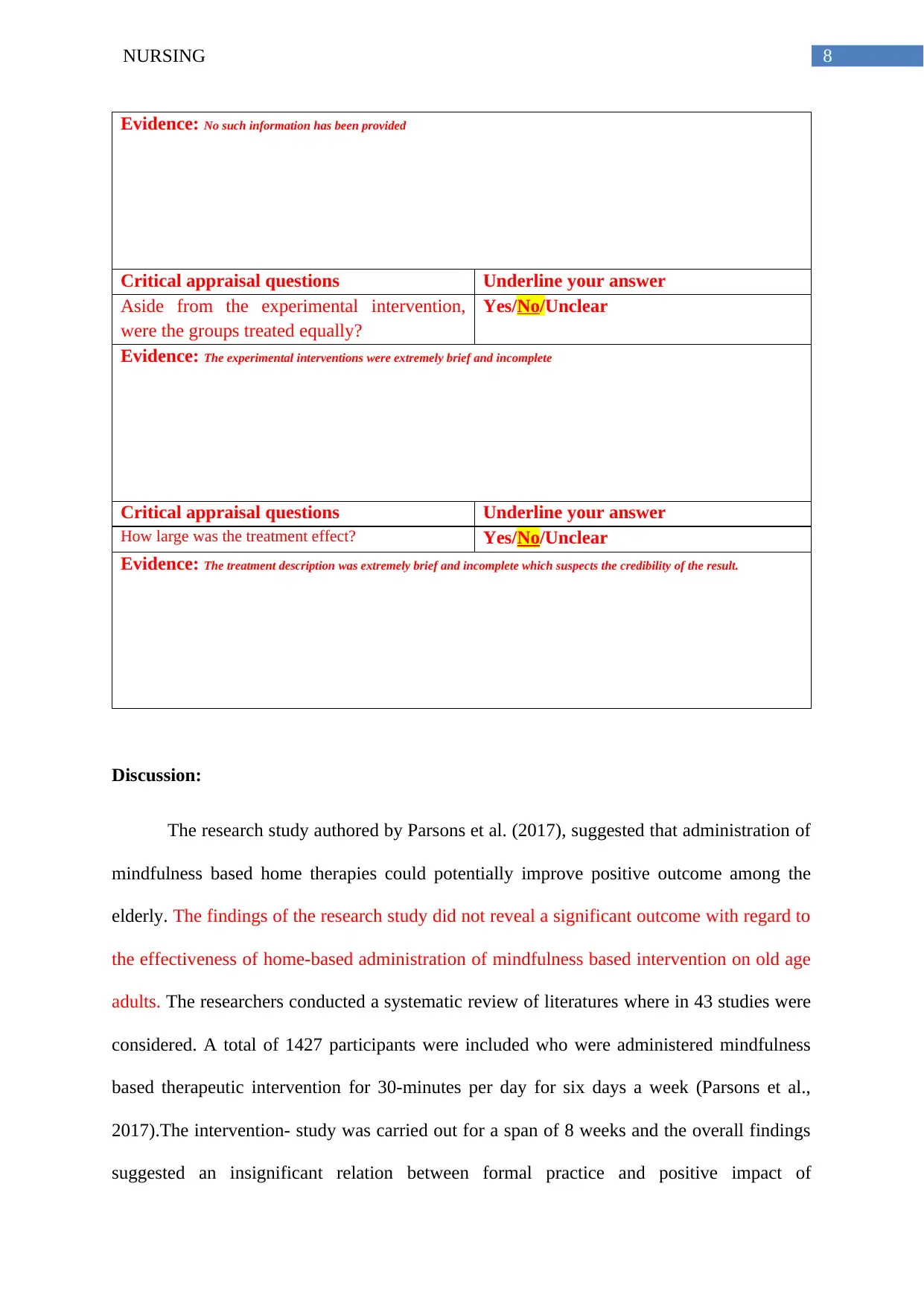
8NURSING
Evidence: No such information has been provided
Critical appraisal questions Underline your answer
Aside from the experimental intervention,
were the groups treated equally?
Yes/No/Unclear
Evidence: The experimental interventions were extremely brief and incomplete
Critical appraisal questions Underline your answer
How large was the treatment effect? Yes/No/Unclear
Evidence: The treatment description was extremely brief and incomplete which suspects the credibility of the result.
Discussion:
The research study authored by Parsons et al. (2017), suggested that administration of
mindfulness based home therapies could potentially improve positive outcome among the
elderly. The findings of the research study did not reveal a significant outcome with regard to
the effectiveness of home-based administration of mindfulness based intervention on old age
adults. The researchers conducted a systematic review of literatures where in 43 studies were
considered. A total of 1427 participants were included who were administered mindfulness
based therapeutic intervention for 30-minutes per day for six days a week (Parsons et al.,
2017).The intervention- study was carried out for a span of 8 weeks and the overall findings
suggested an insignificant relation between formal practice and positive impact of
Evidence: No such information has been provided
Critical appraisal questions Underline your answer
Aside from the experimental intervention,
were the groups treated equally?
Yes/No/Unclear
Evidence: The experimental interventions were extremely brief and incomplete
Critical appraisal questions Underline your answer
How large was the treatment effect? Yes/No/Unclear
Evidence: The treatment description was extremely brief and incomplete which suspects the credibility of the result.
Discussion:
The research study authored by Parsons et al. (2017), suggested that administration of
mindfulness based home therapies could potentially improve positive outcome among the
elderly. The findings of the research study did not reveal a significant outcome with regard to
the effectiveness of home-based administration of mindfulness based intervention on old age
adults. The researchers conducted a systematic review of literatures where in 43 studies were
considered. A total of 1427 participants were included who were administered mindfulness
based therapeutic intervention for 30-minutes per day for six days a week (Parsons et al.,
2017).The intervention- study was carried out for a span of 8 weeks and the overall findings
suggested an insignificant relation between formal practice and positive impact of
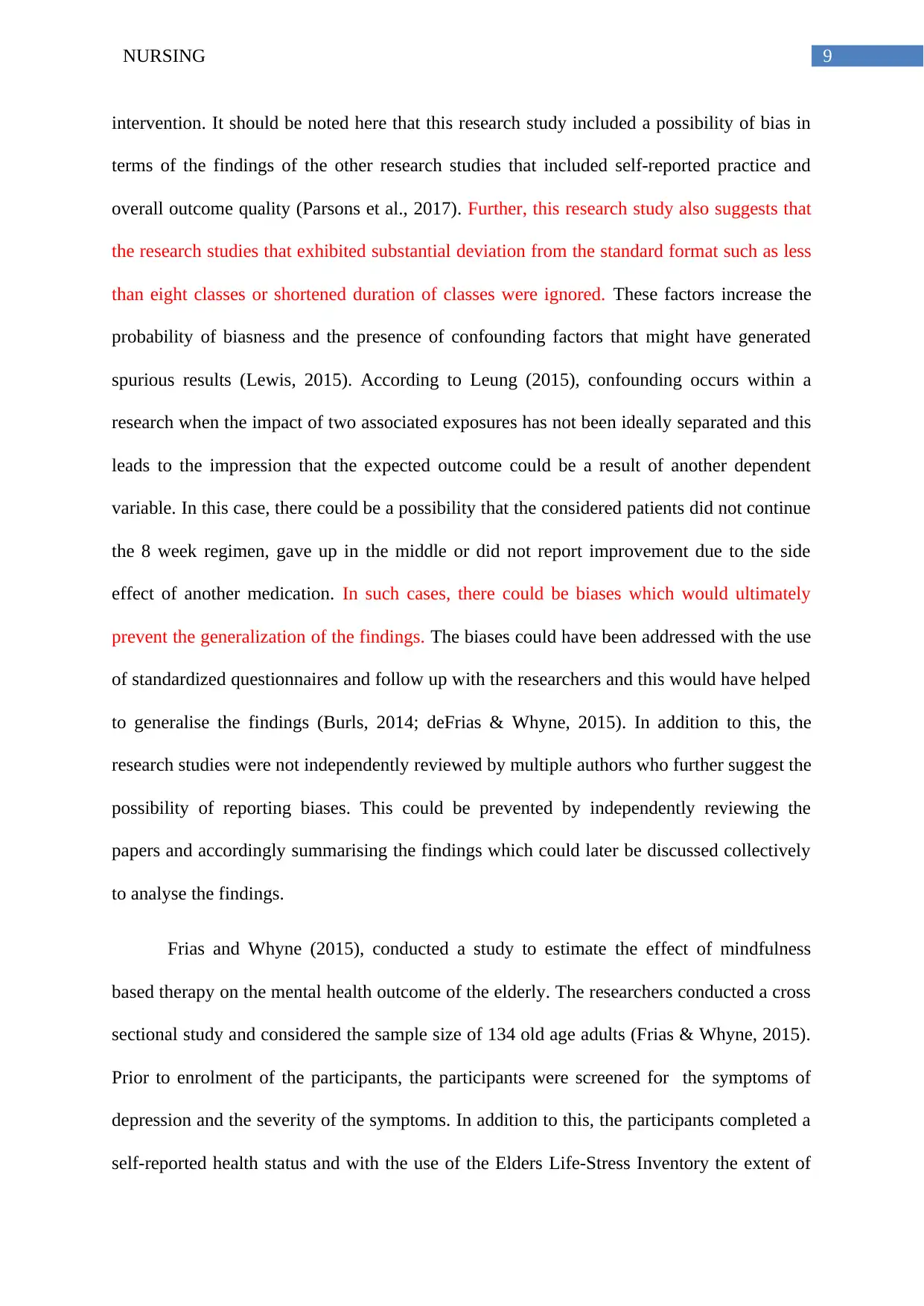
9NURSING
intervention. It should be noted here that this research study included a possibility of bias in
terms of the findings of the other research studies that included self-reported practice and
overall outcome quality (Parsons et al., 2017). Further, this research study also suggests that
the research studies that exhibited substantial deviation from the standard format such as less
than eight classes or shortened duration of classes were ignored. These factors increase the
probability of biasness and the presence of confounding factors that might have generated
spurious results (Lewis, 2015). According to Leung (2015), confounding occurs within a
research when the impact of two associated exposures has not been ideally separated and this
leads to the impression that the expected outcome could be a result of another dependent
variable. In this case, there could be a possibility that the considered patients did not continue
the 8 week regimen, gave up in the middle or did not report improvement due to the side
effect of another medication. In such cases, there could be biases which would ultimately
prevent the generalization of the findings. The biases could have been addressed with the use
of standardized questionnaires and follow up with the researchers and this would have helped
to generalise the findings (Burls, 2014; deFrias & Whyne, 2015). In addition to this, the
research studies were not independently reviewed by multiple authors who further suggest the
possibility of reporting biases. This could be prevented by independently reviewing the
papers and accordingly summarising the findings which could later be discussed collectively
to analyse the findings.
Frias and Whyne (2015), conducted a study to estimate the effect of mindfulness
based therapy on the mental health outcome of the elderly. The researchers conducted a cross
sectional study and considered the sample size of 134 old age adults (Frias & Whyne, 2015).
Prior to enrolment of the participants, the participants were screened for the symptoms of
depression and the severity of the symptoms. In addition to this, the participants completed a
self-reported health status and with the use of the Elders Life-Stress Inventory the extent of
intervention. It should be noted here that this research study included a possibility of bias in
terms of the findings of the other research studies that included self-reported practice and
overall outcome quality (Parsons et al., 2017). Further, this research study also suggests that
the research studies that exhibited substantial deviation from the standard format such as less
than eight classes or shortened duration of classes were ignored. These factors increase the
probability of biasness and the presence of confounding factors that might have generated
spurious results (Lewis, 2015). According to Leung (2015), confounding occurs within a
research when the impact of two associated exposures has not been ideally separated and this
leads to the impression that the expected outcome could be a result of another dependent
variable. In this case, there could be a possibility that the considered patients did not continue
the 8 week regimen, gave up in the middle or did not report improvement due to the side
effect of another medication. In such cases, there could be biases which would ultimately
prevent the generalization of the findings. The biases could have been addressed with the use
of standardized questionnaires and follow up with the researchers and this would have helped
to generalise the findings (Burls, 2014; deFrias & Whyne, 2015). In addition to this, the
research studies were not independently reviewed by multiple authors who further suggest the
possibility of reporting biases. This could be prevented by independently reviewing the
papers and accordingly summarising the findings which could later be discussed collectively
to analyse the findings.
Frias and Whyne (2015), conducted a study to estimate the effect of mindfulness
based therapy on the mental health outcome of the elderly. The researchers conducted a cross
sectional study and considered the sample size of 134 old age adults (Frias & Whyne, 2015).
Prior to enrolment of the participants, the participants were screened for the symptoms of
depression and the severity of the symptoms. In addition to this, the participants completed a
self-reported health status and with the use of the Elders Life-Stress Inventory the extent of
Secure Best Marks with AI Grader
Need help grading? Try our AI Grader for instant feedback on your assignments.
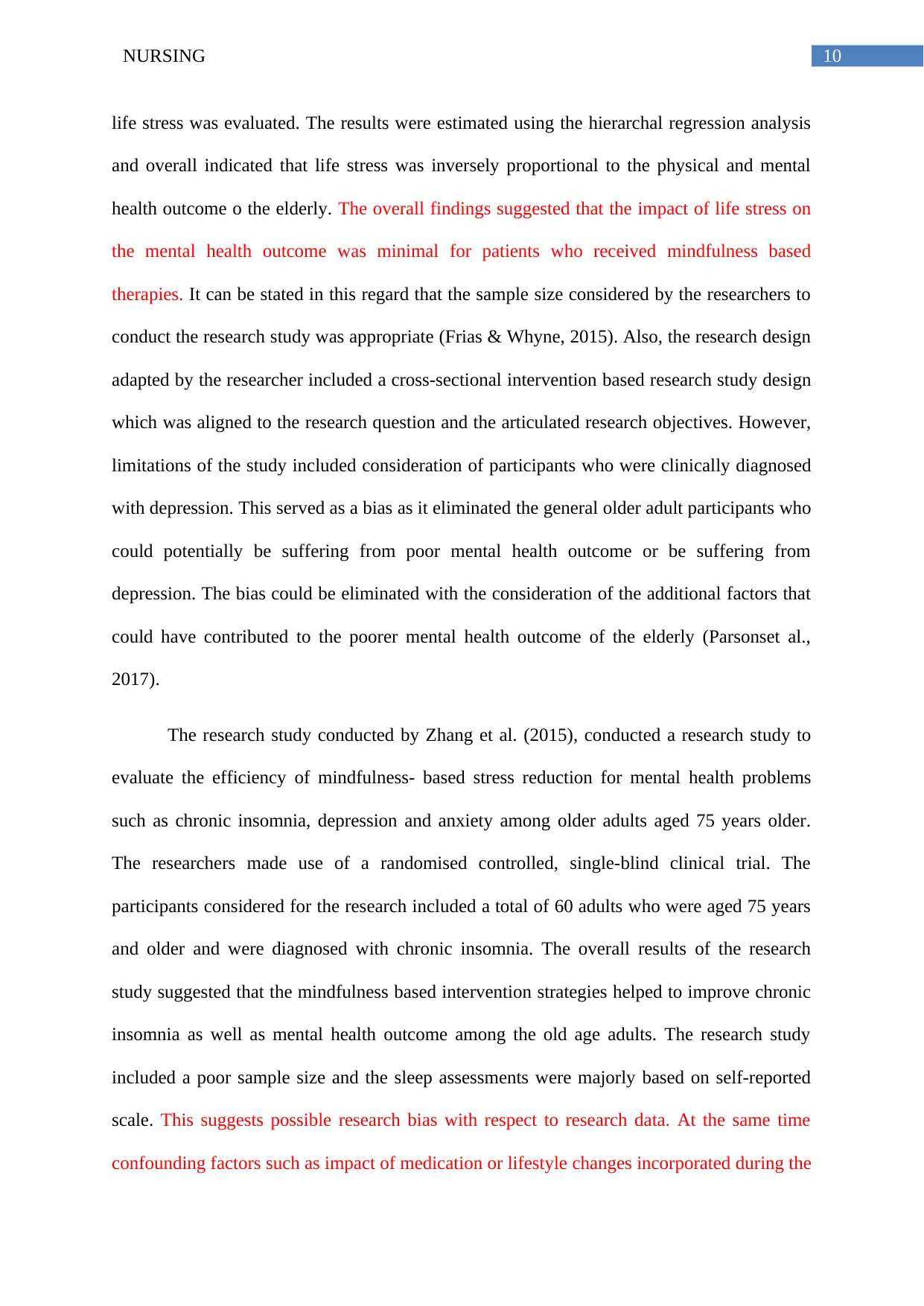
10NURSING
life stress was evaluated. The results were estimated using the hierarchal regression analysis
and overall indicated that life stress was inversely proportional to the physical and mental
health outcome o the elderly. The overall findings suggested that the impact of life stress on
the mental health outcome was minimal for patients who received mindfulness based
therapies. It can be stated in this regard that the sample size considered by the researchers to
conduct the research study was appropriate (Frias & Whyne, 2015). Also, the research design
adapted by the researcher included a cross-sectional intervention based research study design
which was aligned to the research question and the articulated research objectives. However,
limitations of the study included consideration of participants who were clinically diagnosed
with depression. This served as a bias as it eliminated the general older adult participants who
could potentially be suffering from poor mental health outcome or be suffering from
depression. The bias could be eliminated with the consideration of the additional factors that
could have contributed to the poorer mental health outcome of the elderly (Parsonset al.,
2017).
The research study conducted by Zhang et al. (2015), conducted a research study to
evaluate the efficiency of mindfulness- based stress reduction for mental health problems
such as chronic insomnia, depression and anxiety among older adults aged 75 years older.
The researchers made use of a randomised controlled, single-blind clinical trial. The
participants considered for the research included a total of 60 adults who were aged 75 years
and older and were diagnosed with chronic insomnia. The overall results of the research
study suggested that the mindfulness based intervention strategies helped to improve chronic
insomnia as well as mental health outcome among the old age adults. The research study
included a poor sample size and the sleep assessments were majorly based on self-reported
scale. This suggests possible research bias with respect to research data. At the same time
confounding factors such as impact of medication or lifestyle changes incorporated during the
life stress was evaluated. The results were estimated using the hierarchal regression analysis
and overall indicated that life stress was inversely proportional to the physical and mental
health outcome o the elderly. The overall findings suggested that the impact of life stress on
the mental health outcome was minimal for patients who received mindfulness based
therapies. It can be stated in this regard that the sample size considered by the researchers to
conduct the research study was appropriate (Frias & Whyne, 2015). Also, the research design
adapted by the researcher included a cross-sectional intervention based research study design
which was aligned to the research question and the articulated research objectives. However,
limitations of the study included consideration of participants who were clinically diagnosed
with depression. This served as a bias as it eliminated the general older adult participants who
could potentially be suffering from poor mental health outcome or be suffering from
depression. The bias could be eliminated with the consideration of the additional factors that
could have contributed to the poorer mental health outcome of the elderly (Parsonset al.,
2017).
The research study conducted by Zhang et al. (2015), conducted a research study to
evaluate the efficiency of mindfulness- based stress reduction for mental health problems
such as chronic insomnia, depression and anxiety among older adults aged 75 years older.
The researchers made use of a randomised controlled, single-blind clinical trial. The
participants considered for the research included a total of 60 adults who were aged 75 years
and older and were diagnosed with chronic insomnia. The overall results of the research
study suggested that the mindfulness based intervention strategies helped to improve chronic
insomnia as well as mental health outcome among the old age adults. The research study
included a poor sample size and the sleep assessments were majorly based on self-reported
scale. This suggests possible research bias with respect to research data. At the same time
confounding factors such as impact of medication or lifestyle changes incorporated during the
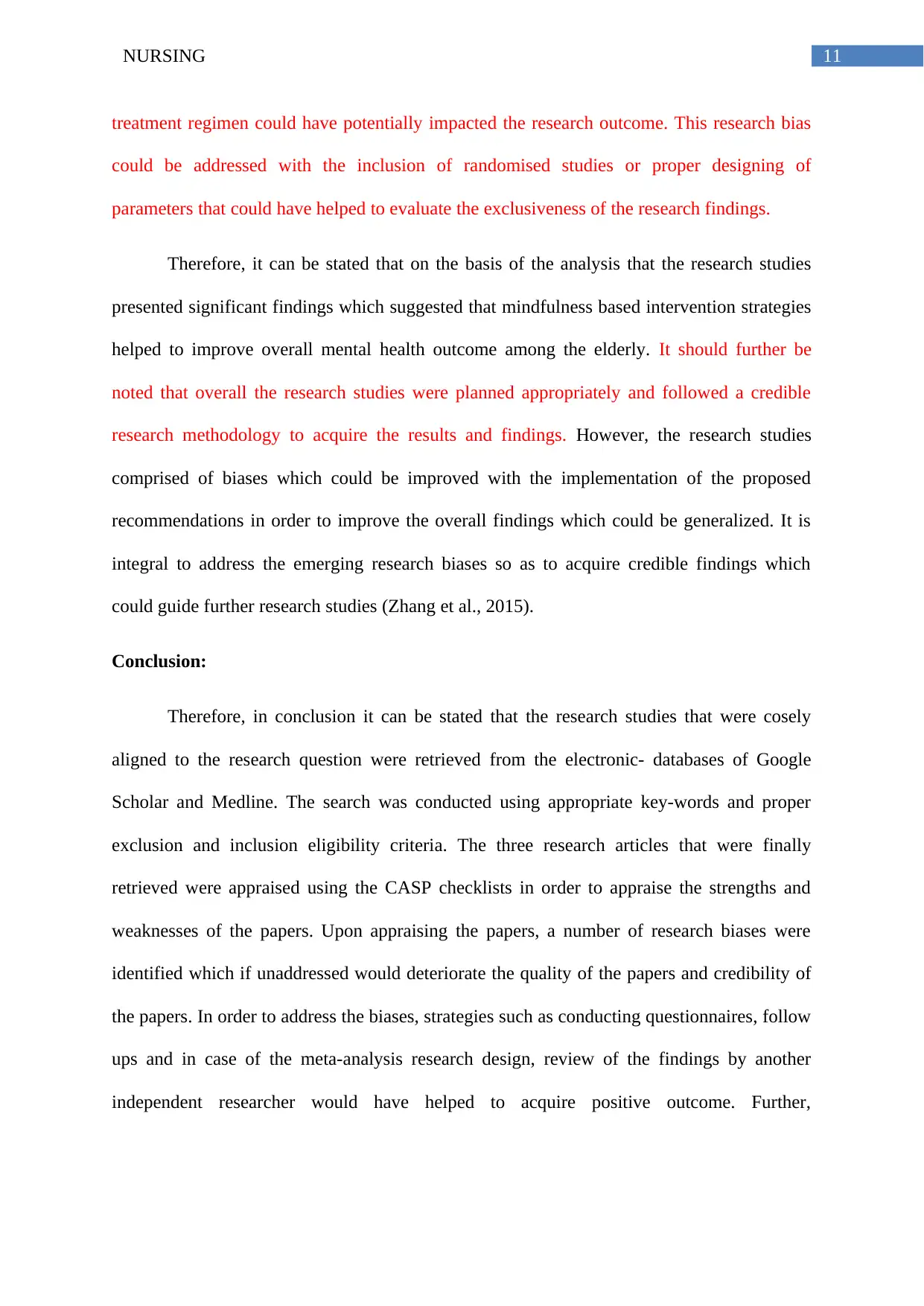
11NURSING
treatment regimen could have potentially impacted the research outcome. This research bias
could be addressed with the inclusion of randomised studies or proper designing of
parameters that could have helped to evaluate the exclusiveness of the research findings.
Therefore, it can be stated that on the basis of the analysis that the research studies
presented significant findings which suggested that mindfulness based intervention strategies
helped to improve overall mental health outcome among the elderly. It should further be
noted that overall the research studies were planned appropriately and followed a credible
research methodology to acquire the results and findings. However, the research studies
comprised of biases which could be improved with the implementation of the proposed
recommendations in order to improve the overall findings which could be generalized. It is
integral to address the emerging research biases so as to acquire credible findings which
could guide further research studies (Zhang et al., 2015).
Conclusion:
Therefore, in conclusion it can be stated that the research studies that were cosely
aligned to the research question were retrieved from the electronic- databases of Google
Scholar and Medline. The search was conducted using appropriate key-words and proper
exclusion and inclusion eligibility criteria. The three research articles that were finally
retrieved were appraised using the CASP checklists in order to appraise the strengths and
weaknesses of the papers. Upon appraising the papers, a number of research biases were
identified which if unaddressed would deteriorate the quality of the papers and credibility of
the papers. In order to address the biases, strategies such as conducting questionnaires, follow
ups and in case of the meta-analysis research design, review of the findings by another
independent researcher would have helped to acquire positive outcome. Further,
treatment regimen could have potentially impacted the research outcome. This research bias
could be addressed with the inclusion of randomised studies or proper designing of
parameters that could have helped to evaluate the exclusiveness of the research findings.
Therefore, it can be stated that on the basis of the analysis that the research studies
presented significant findings which suggested that mindfulness based intervention strategies
helped to improve overall mental health outcome among the elderly. It should further be
noted that overall the research studies were planned appropriately and followed a credible
research methodology to acquire the results and findings. However, the research studies
comprised of biases which could be improved with the implementation of the proposed
recommendations in order to improve the overall findings which could be generalized. It is
integral to address the emerging research biases so as to acquire credible findings which
could guide further research studies (Zhang et al., 2015).
Conclusion:
Therefore, in conclusion it can be stated that the research studies that were cosely
aligned to the research question were retrieved from the electronic- databases of Google
Scholar and Medline. The search was conducted using appropriate key-words and proper
exclusion and inclusion eligibility criteria. The three research articles that were finally
retrieved were appraised using the CASP checklists in order to appraise the strengths and
weaknesses of the papers. Upon appraising the papers, a number of research biases were
identified which if unaddressed would deteriorate the quality of the papers and credibility of
the papers. In order to address the biases, strategies such as conducting questionnaires, follow
ups and in case of the meta-analysis research design, review of the findings by another
independent researcher would have helped to acquire positive outcome. Further,

12NURSING
consideration of the confounding factors and the research- biases would help to improve the
overall quality of the research papers.
consideration of the confounding factors and the research- biases would help to improve the
overall quality of the research papers.
Paraphrase This Document
Need a fresh take? Get an instant paraphrase of this document with our AI Paraphraser
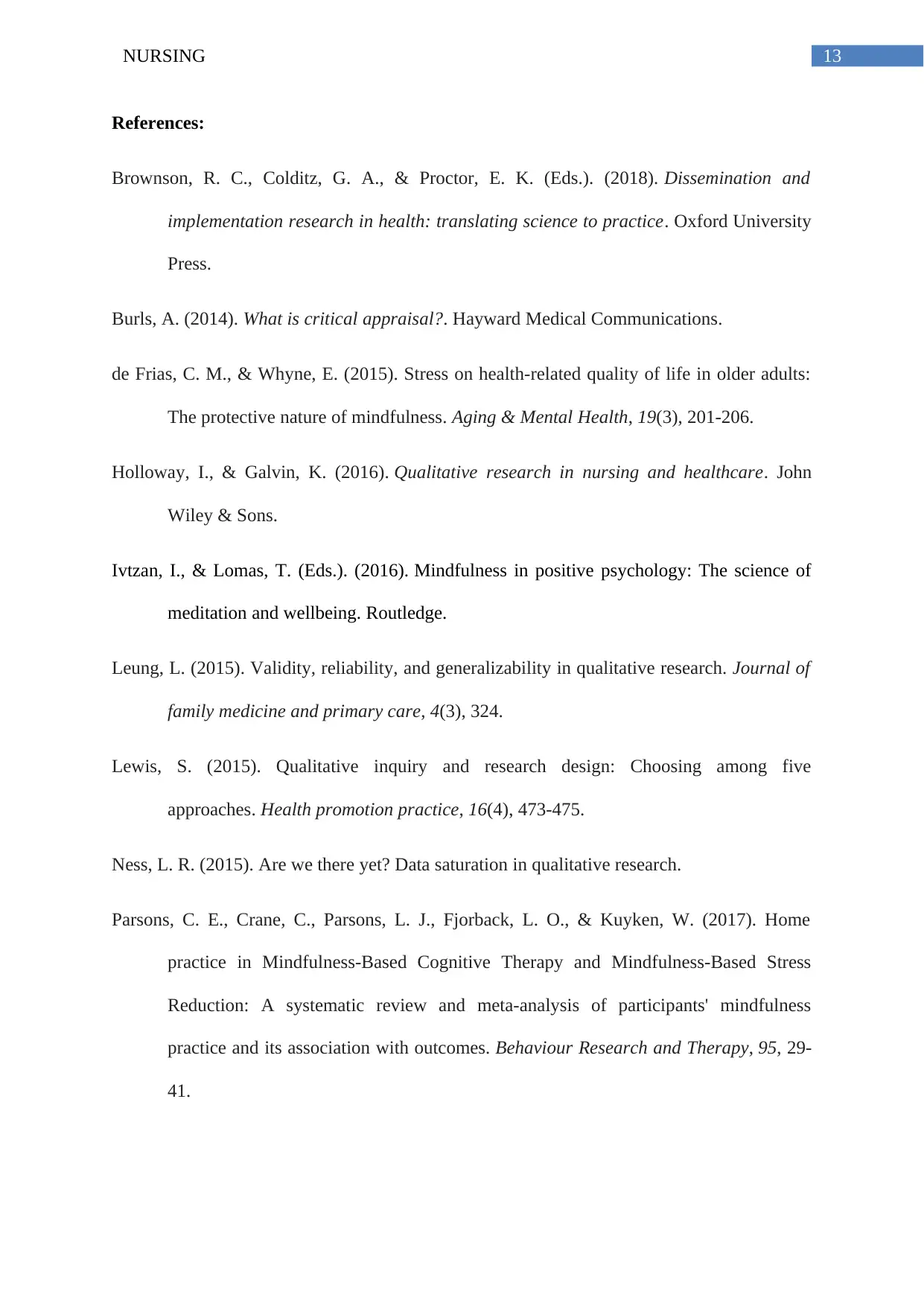
13NURSING
References:
Brownson, R. C., Colditz, G. A., & Proctor, E. K. (Eds.). (2018). Dissemination and
implementation research in health: translating science to practice. Oxford University
Press.
Burls, A. (2014). What is critical appraisal?. Hayward Medical Communications.
de Frias, C. M., & Whyne, E. (2015). Stress on health-related quality of life in older adults:
The protective nature of mindfulness. Aging & Mental Health, 19(3), 201-206.
Holloway, I., & Galvin, K. (2016). Qualitative research in nursing and healthcare. John
Wiley & Sons.
Ivtzan, I., & Lomas, T. (Eds.). (2016). Mindfulness in positive psychology: The science of
meditation and wellbeing. Routledge.
Leung, L. (2015). Validity, reliability, and generalizability in qualitative research. Journal of
family medicine and primary care, 4(3), 324.
Lewis, S. (2015). Qualitative inquiry and research design: Choosing among five
approaches. Health promotion practice, 16(4), 473-475.
Ness, L. R. (2015). Are we there yet? Data saturation in qualitative research.
Parsons, C. E., Crane, C., Parsons, L. J., Fjorback, L. O., & Kuyken, W. (2017). Home
practice in Mindfulness-Based Cognitive Therapy and Mindfulness-Based Stress
Reduction: A systematic review and meta-analysis of participants' mindfulness
practice and its association with outcomes. Behaviour Research and Therapy, 95, 29-
41.
References:
Brownson, R. C., Colditz, G. A., & Proctor, E. K. (Eds.). (2018). Dissemination and
implementation research in health: translating science to practice. Oxford University
Press.
Burls, A. (2014). What is critical appraisal?. Hayward Medical Communications.
de Frias, C. M., & Whyne, E. (2015). Stress on health-related quality of life in older adults:
The protective nature of mindfulness. Aging & Mental Health, 19(3), 201-206.
Holloway, I., & Galvin, K. (2016). Qualitative research in nursing and healthcare. John
Wiley & Sons.
Ivtzan, I., & Lomas, T. (Eds.). (2016). Mindfulness in positive psychology: The science of
meditation and wellbeing. Routledge.
Leung, L. (2015). Validity, reliability, and generalizability in qualitative research. Journal of
family medicine and primary care, 4(3), 324.
Lewis, S. (2015). Qualitative inquiry and research design: Choosing among five
approaches. Health promotion practice, 16(4), 473-475.
Ness, L. R. (2015). Are we there yet? Data saturation in qualitative research.
Parsons, C. E., Crane, C., Parsons, L. J., Fjorback, L. O., & Kuyken, W. (2017). Home
practice in Mindfulness-Based Cognitive Therapy and Mindfulness-Based Stress
Reduction: A systematic review and meta-analysis of participants' mindfulness
practice and its association with outcomes. Behaviour Research and Therapy, 95, 29-
41.
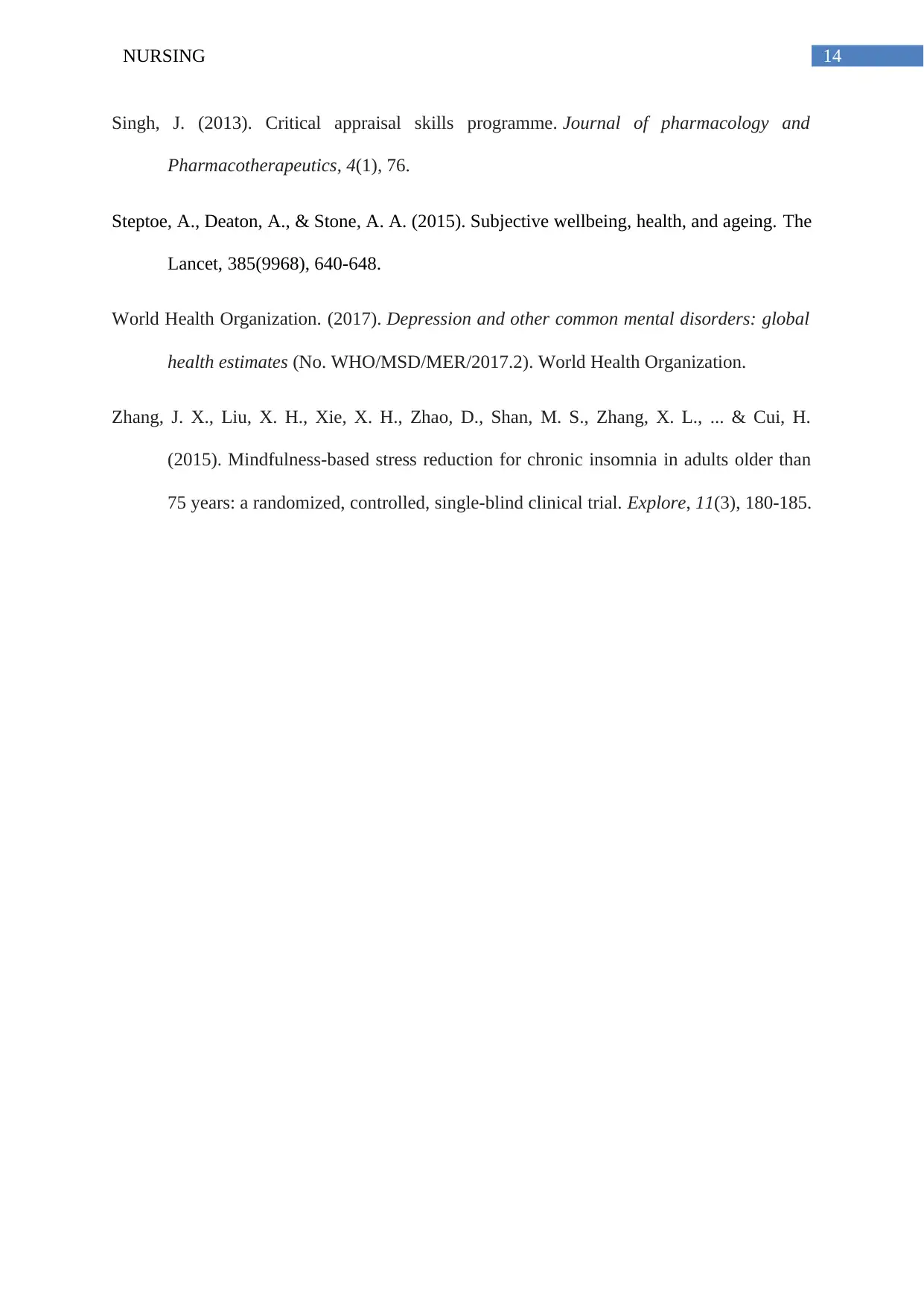
14NURSING
Singh, J. (2013). Critical appraisal skills programme. Journal of pharmacology and
Pharmacotherapeutics, 4(1), 76.
Steptoe, A., Deaton, A., & Stone, A. A. (2015). Subjective wellbeing, health, and ageing. The
Lancet, 385(9968), 640-648.
World Health Organization. (2017). Depression and other common mental disorders: global
health estimates (No. WHO/MSD/MER/2017.2). World Health Organization.
Zhang, J. X., Liu, X. H., Xie, X. H., Zhao, D., Shan, M. S., Zhang, X. L., ... & Cui, H.
(2015). Mindfulness-based stress reduction for chronic insomnia in adults older than
75 years: a randomized, controlled, single-blind clinical trial. Explore, 11(3), 180-185.
Singh, J. (2013). Critical appraisal skills programme. Journal of pharmacology and
Pharmacotherapeutics, 4(1), 76.
Steptoe, A., Deaton, A., & Stone, A. A. (2015). Subjective wellbeing, health, and ageing. The
Lancet, 385(9968), 640-648.
World Health Organization. (2017). Depression and other common mental disorders: global
health estimates (No. WHO/MSD/MER/2017.2). World Health Organization.
Zhang, J. X., Liu, X. H., Xie, X. H., Zhao, D., Shan, M. S., Zhang, X. L., ... & Cui, H.
(2015). Mindfulness-based stress reduction for chronic insomnia in adults older than
75 years: a randomized, controlled, single-blind clinical trial. Explore, 11(3), 180-185.
1 out of 15
Your All-in-One AI-Powered Toolkit for Academic Success.
+13062052269
info@desklib.com
Available 24*7 on WhatsApp / Email
![[object Object]](/_next/static/media/star-bottom.7253800d.svg)
Unlock your academic potential
© 2024 | Zucol Services PVT LTD | All rights reserved.





